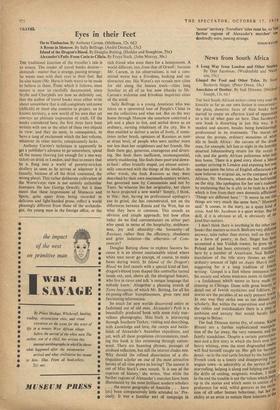'TRAVEL
Eyes in their Feet
On to Timbuctoo. By Anthony Carson. (Methuen, 12s. 6d.) A Room in Moscow. By Sally Belfrage. (Andre Deutsch, 15s.) THE traditional function of the traveller's tale is to amaze. The reader of travel books desires- demands—matter that is strange, passing strange: he wants men with their eyes in their feet. But he also wants (Mr. Have-it-both-ways) to be made to believe in them. From which it follows, since nature is now so carefully documented, since Scylla and Charybdis are now so definitely out, that the author of travel books must either write about somewhere that is still completely unknown (difficult) or must else contrive to project, on to known territory, a new world of his own that yet conveys an ultimate impression of truth. Of the books considered here, the first three have been written with one or the other of these two objects in view; and they do seem, in consequence, to have a tang of excitement which the last volume, whatever its other merits, conspicuously lacks.
Anthony Carson's technique is apparently to get a publisher's advance to go somewhere, spend all the money (leaving just enough for a one-way ticket) on drink in London, and thus to ensure that he is flung into a world of poverty-stricken drollery as soon as he arrives at wherever it is (usually, because of all the drink consumed, the wrong place). This rather deliberate cultivation of the Worm's-eye view is not entirely unfamiliar (compare the late George Orwell); but it does mean that these impressions of Morocco and Spain, quite apart from being recorded in delicious and light-handed prose, reflect a world pleasingly different from those of the archmolo- gist, the young man in the foreign office, or the rich friend who went there for a honeymoon. A world different, too, from that of Orwell: because Mr. Carson, in his observations, is not a com- mitted worm but a frivolous, basking and un- distracted one. His Worm's eye reveals new cities for old along the beaten track—cities long familiar to all of us but now (thanks to Mr. Carson's welcome and frivolous inquiries) cities of the mind.
Sally Belfrage is a young American who was taketi on a sponsored tour of People's China to see the collectives and what not. But on the way home through Moscow she somehow contrived a job and a place to live, and settled down as an
ordinary, earning inhabitant of the city. She is thus enabled to deliver a series of lively, if some- times rather brash, opinions of Russians as seen at street level, of people who were neither more nor less than her neighbours and her friends. She finds them gay, generous, courageous and divert- ing. She finds them inefficient, inconsequential, utterly maddening. She finds them poor and down- at-heel : often brutally stupid, yet almost univer- sally concerned with the things of the intellect. In other words, she finds Russians as they were described by their own nineteenth-century writers, but governed now by Communists and not by Tsars. So wherein lies her originality, her claim to have projected a new world? Simply, I think, in this : that, having no professional apologist's axe to grind, she has concentrated, not on the differences between Russia and the West, but on what they have in common. This sounds an obvious and simple approach; but how often today do we find commentators on either part who speak in terms of the hospitality, stubborn- ness, joy and absurdity—the humanity—of Russians, rather than the efficiency, obedience and grim isolation—the otherness—of Com- munists?
Douglas Bolting chose to explore Socotra be- cause it is an almost unattainable island where white men never go (except, of course, to make bases during wars). In Island of the Dragon's Blood we find camels with a special kind of feet, dragon's-blood trees shaped like umbrellas turned inside out, and, above all, the aboriginal Sokotri, who live in caves and talk 'a unique language that nobody knew.' Altogether a pleasing stretch of Terra Incognita, of which Mr. Botting, for all his ex-young-officer bumptiousness, gives rare and fascinating information.
So much for new worlds discovered entire or fashioned out of old ones. Alexander's Path is a beautifully produced book with some truly mar- vellous photographs; Miss Stark is journeying through Southern Turkey, visiting and describing, with knowledge and love, the camps and battle- fields of Alexander's Anatolian expedition; and yet, with all these propitious circumstances, read- ing this book is like swimming through cotton- wool. There are haunting phrases, passages of civilised reflection, but still the interest eludes one. Why should the refined dissertation of a dis- tinguished scholar on one of the most attractive heroes of all time prove so boring? The answer is out of Miss Stark's own mouth. 'It is one of the caprices of history,' she writes, 'that while the farther regions of Alexander's marches have been illuminated by the most brilliant modern scholars . . . the nearer geography of Anatolia . . . have [sic] been comparatively little attended to.' Pre- cisely. It was a familiar sort of campaign in `nearer' territory. Travellers' tales must be, e farther regions of Alexander's marches doubtedly were, passing strange. s 'the I top
SIMON F AVE$


































 Previous page
Previous page